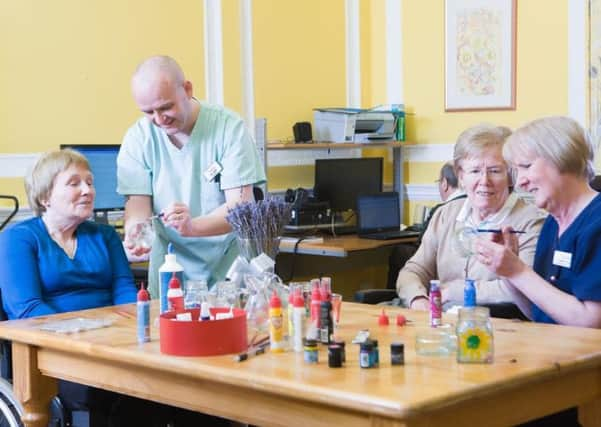James Penn-Dunnett: Respite goes long way at dedicated centre


For five years, I have been the main carer for my wife Elizabeth who has frontotemporal dementia and takes occasional epileptic seizures. She is wheelchair bound and unable to communicate or feed herself, and so needs 24-hour care, seven days a week. On a daily basis my caring role involves preparing meals, feeding and administering medication, as well as carrying out the household chores. Since my wife had a fall and broke her hip in 2012, the local council has helped with her personal care support.
Following an onerous nine-month process of applying for Guardianship, my wife now receives financial help through the Self Directed Support scheme from our local authority. I choose to use this resource to get some respite care for Elizabeth because it makes such a difference to both of us. Respite breaks are very important to me. As a full-time carer with a 24/7 role, you need regular breaks to recharge your batteries. My wife also needs a change of environment and additional social interaction.
Advertisement
Hide AdAdvertisement
Hide AdGetting the right kind of respite and care is essential. It’s about both the quality of the break and the expertise of the care. Without Leuchie House, the only option for my wife would be a respite break in a care home, where they’re just not geared up to providing the stimulus and support a dedicated respite centre can offer. People with long-term conditions need something better than just respite in a care home. At Leuchie, I can be confident too that if my wife has a seizure, the staff are fully trained to give emergency seizure medication. Other respite organisations I’ve used previously were unable to guarantee that their staff would be seizure trained. The quality of respite also applies to how you’re able to use it and whether it gives you a proper break. I have two half days a week of what I call “working respite”. I mainly use this for shopping, medical appointments, meetings and generally catching up.
Then every three months or so my wife and I have eleven days of proper quality respite at Leuchie House.
Leuchie is Scotland’s only dedicated respite centre for people with long term conditions. It provides 24-hour personalised care to people with a wide range of conditions including MS and Parkinson’s, as well as conditions like Elizabeth’s. It offers much more than just expert care, however. Accessible activities, trips and entertainment, home-made food, physiotherapy and relaxing therapies all mean it’s a much-needed break from the norm and a proper holiday. While carers can choose not to go with their loved ones to Leuchie – all the caring is done for you – I like to accompany my wife as this allows us to have our meals and some time together. But it also gives me the flexibility to go off to pursue my own interests knowing that she will be properly looked after.
When at Leuchie, Elizabeth seems to be more relaxed, and particularly enjoys the food and the musical entertainment. I feel very relaxed too and able to do things such as reading and walking that I would not have been able to do at home. I believe there is an urgent need for respite centres throughout Scotland to provide short term care and respite for people with long term conditions. This should be available to all and not just those who can afford it or have Self Directed Support.
As both the number of people living with degenerative conditions, and consequently the number of unpaid carers like myself, continues to grow it’s also going to be essential that more dedicated day-to-day support is available in the community.
There are some excellent models of one-stop-shop support services in some parts of Scotland that counter the isolation people living with long term conditions often experience. They provide access to all kinds of therapies, ongoing advice and help, as well as a chance to socialise. There’s nothing like this in my area. The only option available to us is a day centre for wheelchair bound people which in my opinion and experience is a waste of good resource.
Practical ongoing training for carers to help us with our caring role is also increasingly important. In the past five years, I’ve received only an hour of moving and handling training at home. I haven’t been able to participate in other training on offer because my respite arrangements don’t match the course schedule.
Few of us can predict that we might end up in a full-time caring role. But one thing is certain, the number of people in this position is growing all the time. It’s predicted that three in five of Scotland’s adult population will become carers in the next few years. It’s time to make sure the respite care and community support is in place to help them cope.
• James Penn-Dunnett is a full-time carer, who has occasional breaks at Leuchie with his wife